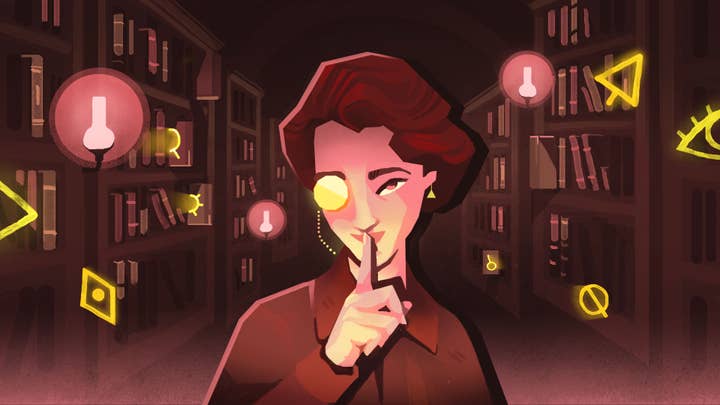Weather Factory on the advantages of being "weird and divisive"
Co-founder Lottie Bevan talks about scrapping the studio's plans based on a single tweet, and how open development keeps experimental games on track
Despite being a creative sector, the games industry is one of cold rationalities when it comes to business. Being art doesn't inoculate the industry against a need for spreadsheets, business development plans, and telemetry data.
The story of how Weather Factory landed on its current development project is the sort of thing that makes suited gaming execs' blood run cold. After pulling together a production plan for its next game following the surprise success of Cultist Simulator, Weather Factory threw everything out the window on the basis of a single tweet.
Creative director Alexis Kennedy posted a work-in-progress idea on Twitter for a game similar to Cultist Simulator, but about putting books away in a quiet library. It seemed to resonate with people and, after some back and forth, it was decided that would be the studio's next game if it got over 1,000 retweets. You can almost hear business development managers around the world shuffling anxiously at the idea of putting a studio's future in the hands of the capricious social media gods.
Well, 1,000 retweets later and Weather Factory finds itself working on The Book of Hours. Based on many of the mechanics and systems from Cultist Simulator, Weather Factory hopes to appeal to a wider audience with the new title by dialing back some of the more esoteric or punishing aspects. It seems like a risky move, but studio co-founder and director Lottie Bevan disagrees, saying it ties into the studio's philosophy of open development.

"The whole point of being very open about this stuff is we get feedback which means that we do get a sense quite early on in production and in pre-production -- even before pre-production -- of what kind of stuff people are really engaging with," she tells GamesIndustry.biz. "We don't use that entirely as a weather vein, certainly we never decided to make an entire game and scale of a studio on the base of a tweet before... [But] there was something there, it was inline with some of the more crazy ideas we were talking about... and I think that's worth chasing."
Bevan will be giving a talk at Develp: Brighton on Tuesday, July 9 detailing the studio's first year, from day one to the release of a successful game. In February, Weather Factory announced that Cultist Simulator had sold over 100,000 copies in its first year, and was generating enough revenue "to cover our costs, and then some, most months."
Kennedy, who founded Failbetter Games in 2010, left the studio in 2016. A year later, he co-founded Weather Factory with Bevan, his partner and a former producer at Failbetter, with the remit of making more experimental games. While Failbetter is known for fairly outlandish narrative-based games, Bevan said they "felt it would be irresponsible" to try and move the studio in that direction, and risk the livelihoods of its 18 staff "if it all goes bollocks up."
Despite being willing to risk it with Cultist Simulator, there was a sense that the project should be handled without sinking their entire financial reserve into the game. This meant that Cultist Simulator was developed in just 11 months, and spot on the budget of £142,000.
"I think the worst response you can get to an indie game is 'meh', because that means you're just not going to do anything"
"We thought there was no point going all in here; we're a new studio, and Alexis has a bit of kudos, but there are so many games out there and so many studios," says Bevan. "It's not like Bethesda announcing a new game and everyone in the world and their mum buys it immediately. This random name Weather Factory, what does that mean? So we deliberately made a cheap experimental game that lent into what we personally were good at, which is text-based weird narrative with 2D art, and to our astonishment it did a lot better than we thought it was going to do."
That success can be attributed to a few different things, but Bevan notes the importance of open development, and being "weird and divisive", which she says is "the most useful thing you can have as an indie right now in PC games."
"I think the worst response you can get to an indie game is 'meh', because that means you're just not going to do anything," she continues. "No one is going to talk about you, no one is going to buy your game, no one is going to proselytise for you... [But] people who like it want to convince other people to like it, so you start to get these zealots who basically act as an expanded marketing team for me, because they're going out do my job better than I ever could... With Book of Hours, what we're trying to do is get the same level of verve and fire, but maybe less of the negativity."
Getting people talking about your game is key, and open development is another way you can do this says Bevan: "The sooner you start, the sooner you can get people to gather."
She and Kennedy began publicly sharing details about Cultist Simulator back when its just "a really ugly, entirely text-based javascript demo."
"They were not remotely representational of the final product, and over the course of the year that we spent developing it, we kind of picked up momentum from constantly talking about it and constantly getting people interested in it," says Bevean. "So this isn't a technique that everybody likes, but it's something that naturally Alexis and I are very well suited to and have done before. We basically gob off on Twitter and people seem to like that."
"Having this constant discourse with people... is a godsend for making experimental games"
It's more than gobbing off on Twitter, though. The games industry is not unique with the problems it faces around managing consumer expectations, but we've all seen the social media frenzies that can erupt if a game falls short in the eyes of its players. However, as Bevan suggests, the transparent honesty of open development can help mitigate this.
"Understandably, some players will miss that you didn't put pets in your game or something else that you really wanted," she says. "But if you have been speaking consistently to people consistently over a period of months, or nearly a year in our case, you do develop a relationship with them that is much more like a dialogue. It's not just a bland press announcement that people might react badly to if it's a bit succinct or they don't like what's in it... So all the way we develop this very human relationship with our fans, which meant that if we did renege on something we suggested, they didn't mind because we would give them an explanation into why."
On top of that, without open development, Bevan says Cultist Simulator "would be quite a terrible game." It's a deliberately obtuse and, at times, crushing experience, but this comes with its own host of problems.
"If we hadn't had ultimately thousands of people playing it over several months, we'd have got to release date and people would have said, 'What the hell is this?'" says Bevan. "So having this constant discourse with people, provided that it doesn't actually get in the way of development, is a godsend for making experimental games because you do constantly get to check, 'it makes sense in my head, but actually does it translate?'"
As with Cultist Simulator, Weather Factory will be employing an open development process for its next game. The Book of Hours was announced in May this year, with planned release date of 2021.
GamesIndustry.biz is a media partner for Develop:Brighton 2019 and will be attending with the assistance of the organisers.

